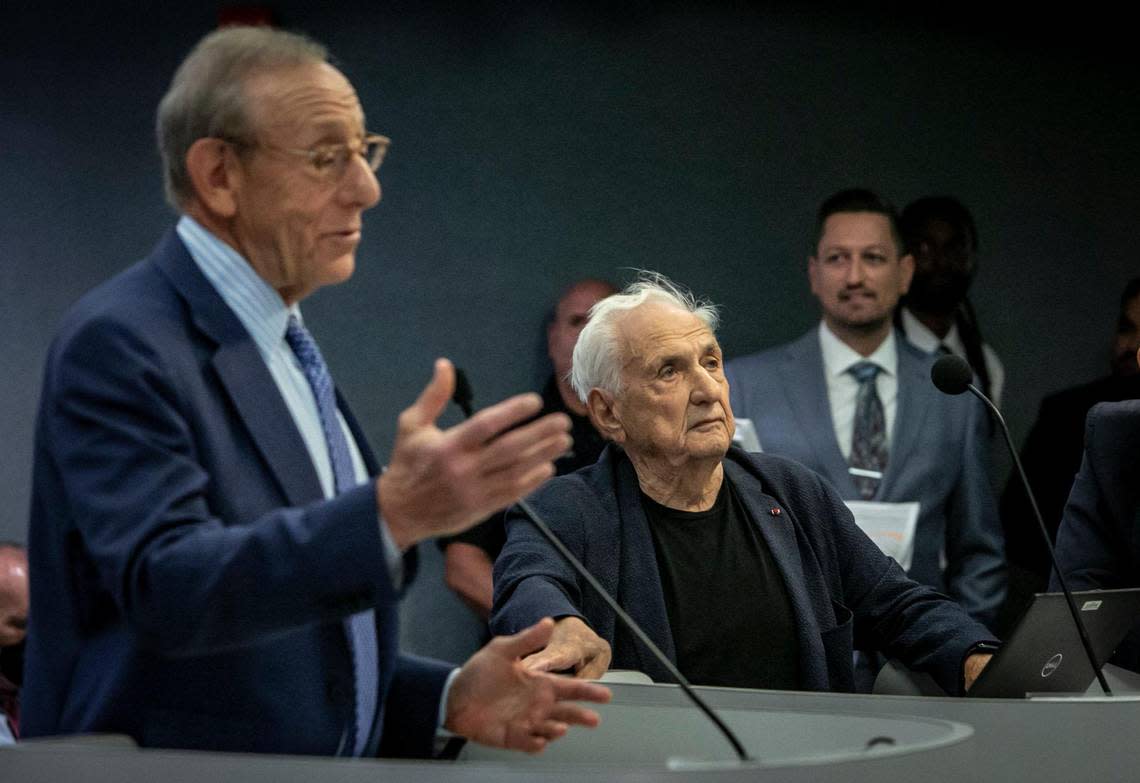Will future of the Deauville site go back to voters? A Florida bill may not allow it
After Miami Beach voters rejected a proposal in November by billionaire developer and Miami Dolphins owner Stephen Ross to exceed building-size regulations for a condo and hotel project at the former Deauville Beach Resort site, Ross began wondering if the city could hold another referendum on the matter this year.
He raised the idea last month at a meeting with Miami Beach Mayor Dan Gelber, who directed city staff to ask Miami-Dade County’s elections department if and when they could hold a special election. The department said it could accommodate a mail-only election in July.
“He and his team wanted to know what the possibilities might be,” Gelber said of Ross. “I’m hoping they’re thinking about it, because Lord knows an empty lot is a drain on that community economically.”
Now, it appears voter approval won’t be necessary — or even allowed — for the project to move forward.
Under legislation passed by the Florida Senate and House and expected to be signed by Gov. Ron DeSantis, voter referendums related to land development regulations like the Deauville item would be against the law.
Making changes to such regulations would fall squarely on local governments — in the case of Miami Beach, requiring a recommendation by the Planning Board and approval by five of seven city commissioners.
“You should not govern by referendum,” state Rep. Vicki Lopez, a Republican whose district includes Key Biscayne and parts of Miami, said before voting for the bill Tuesday.
The legislation could also have a major impact in Key Biscayne, which has had a requirement since 2007 that voters approve any text amendments to the zoning code or other land-development regulations. Those types of issues would appear to fall under the Legislature’s new ban.
Key Biscayne officials did not immediately respond to requests for comment.
A proposal for voter approval for zoning changes in Pinecrest was rejected by voters in March.
Easier road for developers?
An attorney for Ross, former Miami Beach Mayor Neisen Kasdin, told the Miami Herald on Tuesday that there is “nothing in the works” on a potential special election for the Deauville site.
Later on Tuesday, the bill, which had passed in the Senate by a 35-4 vote, was approved in the House, 91-26.
Representatives for Ross did not respond to questions about whether the legislation played a role in his apparent decision not to pursue a special election.

The bill expands on existing language that prohibits referendums on development permit orders and another provision preventing referendums on comprehensive plan and zoning map amendments unless such votes are “expressly authorized” in a local charter that was in effect on June 1, 2011.
The expansion will seemingly put an end to Miami Beach ballot questions that ask voters to allow increased floor-area ratio (FAR) — a metric used to regulate building size — beyond current regulations. Such questions are common in Miami Beach, where a voter referendum is required for developers to exceed FAR limits. There were three such questions, including the Deauville item, on the ballot last November.
“Now it would be even more important for folks to elect people based on their positions on development issues,” said Daniel Ciraldo, executive director of the Miami Design Preservation League.
The bill could also potentially allow Miami Beach elected officials to limit the powers of the city’s Historic Preservation Board or lower preservation standards, matters that fall under the city’s land development regulations and have previously required a voter referendum.
Miami Beach City Attorney Rafael Paz said his office is still analyzing the legislation and preparing a memo about the expected impacts.
Preservation advocates and city officials have been focused in recent weeks on a different bill that would have gutted local governments’ ability to protect historic structures. Sponsors said Thursday that bill was dead for this year.
Meanwhile, the attempt to restrict voter input on development matters has flown under the radar. The language was originally part of a different bill, SB 856, which was pulled in late March by its sponsor, state Sen. Ana Maria Rodriguez, R-Doral, amid a lack of support.
But in late April, Rodriguez inserted the language into an unrelated bill pertaining to annexation procedures, where it was ultimately approved.
“It seems like there’s an attempt at the state level to remove the voters’ voice,” said Ciraldo, “which is alarming.”
